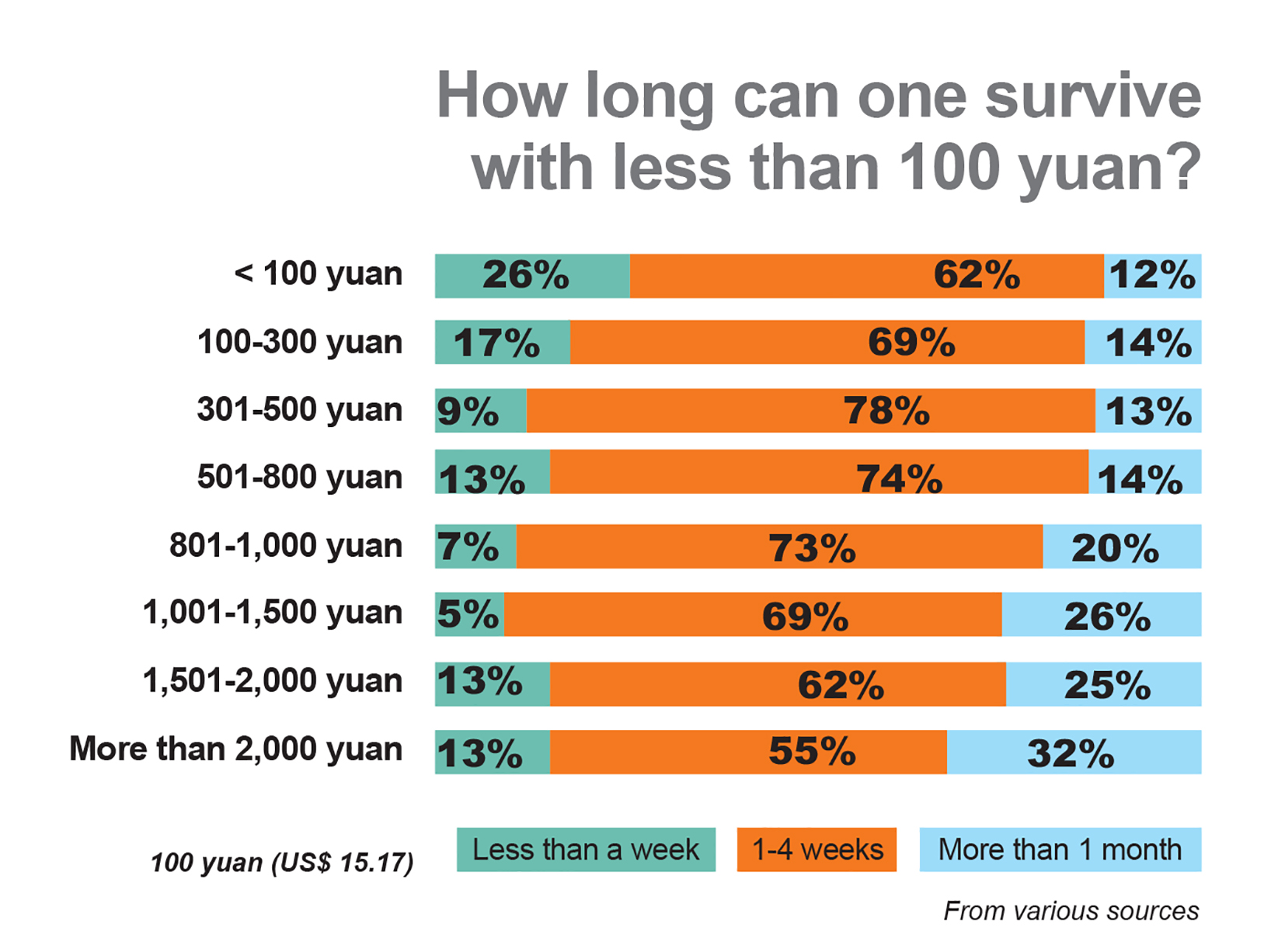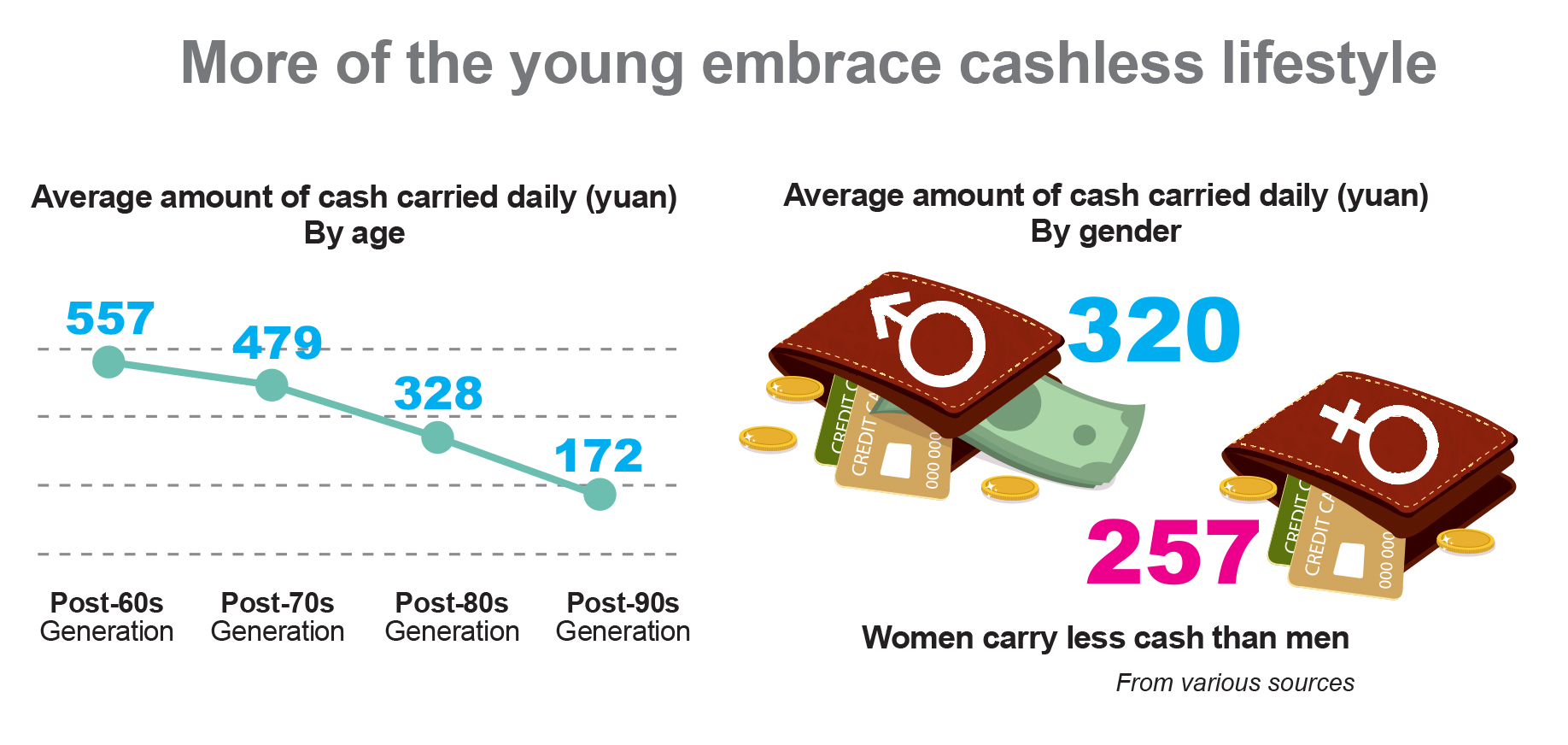Decades after Deng Xiaoping’s economic reform, China’s economy continues to evolve. Now, the country is poised to become the world’s first cashless society. The Jakarta Post’s Ika Krismantari and Benni Yusriza recently visited China on the sponsorship of the Chinese Embassy in Jakarta to see how technological advances and the widely available internet have transformed Chinese people’s lives in every aspect.
The prevalence of China’s mobile payments is hard to overlook. Not only is everyone talking about the e-payment platforms, but also people are using them in their daily lives to the point where it seems they can’t live without them.
Tourist guides, shop attendants, street vendors, waiters, snack sellers and street buskers all ask if you want to pay or donate using WeChat or Alipay – the most popular smartphone payment option. Cash may be used as the last resort.
“I pay for my groceries with this as well as my taxi fares,” 35-year-old Li Nan from Beijing said, while showing off the WeChat Pay app on his phone to The Jakarta Post.
The tourist guide quipped he could not live without the app, which makes his day-to-day transactions much easier.
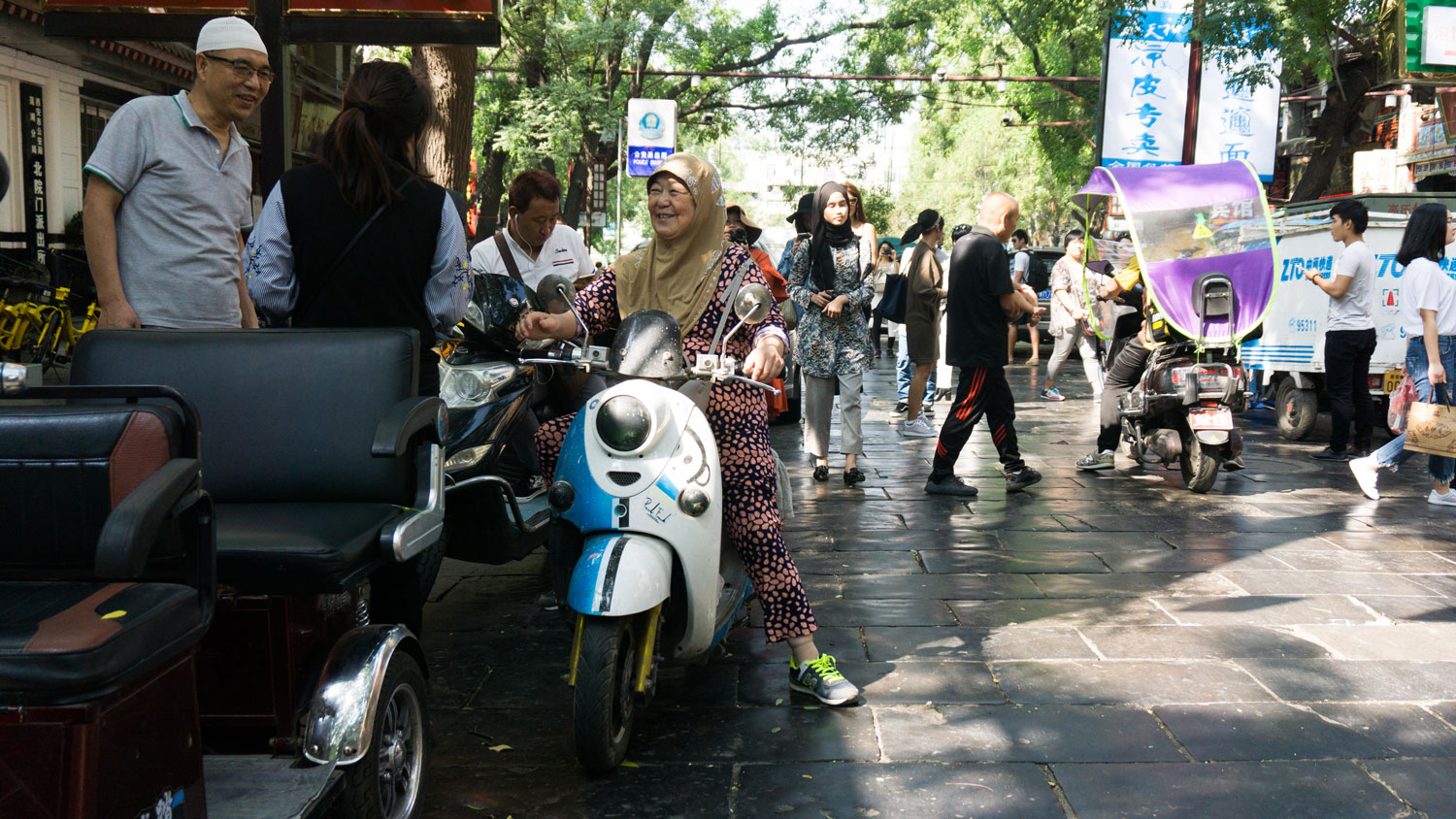 Sunny afternoon: Chinese Muslims make small talk on Muslim Street in Xi’an, China. (JP/Benni Yusriza)
Sunny afternoon: Chinese Muslims make small talk on Muslim Street in Xi’an, China. (JP/Benni Yusriza)
Cash has become somewhat a relic of the past in China as the cashless trend is taking hold in the country, with mobile payment becoming a basic necessity. As of the end of 2016, more than half of China’s population, or about 731 million people, was connected to the internet, and 95 percent of them, or around 695 million, were on mobile internet.
According to a report from scholarly journal Big Data Research, China’s mobile transactions totaled 38.6 trillion yuan (US$5.8 trillion) in 2016, or an increase of more than 200 percent from the previous year. Bloomberg columnist Adam Minter even called that year “China’s cashless revolution.”
 In the alley: A woman checks her phone while conversing with a friend. (JP/Benni Yusriza)
In the alley: A woman checks her phone while conversing with a friend. (JP/Benni Yusriza)
Another study conducted by the Tencent Research Institute, owned by Tencent – WeChat’s developer – also shows a similar trend of China going toward a cashless society. Based on WeChat Pay data and an online survey involving 6,595 respondents, the report showed that Chinese consumers spent $5.5 trillion through mobile payment platforms last year, about 50 times more than their American counterparts. Half of the respondents also stated that they conducted less than 20 percent of their monthly transactions with cash. The respondents said they only paid in cash when no other payment methods were available (73 percent) or for small transactions (46 percent).
Both old and young generations in China have agreed that cash is so last year. According to the Tencent study, young people, especially women, lead the cashless trend in China. The post-80s generation said they spent less than one-fifth of their money each month using cash. But, even the older generation is joining the trend, with 45 percent of respondents born in the 1960s saying they used cash less than 20 percent of the time.
The report also indicates that mobile payments had conquered service industries from travel, entertainment, retail to dining. In China, every segment of the dining industry has adopted mobile payment. Fast-food chains and high-end restaurants to fruit vendors and food stands all receive mobile payments.
For example, during our stop at a food stand in Beijing, the shopkeeper refused cash from buyers because she did not have enough cash for change; she kept pointing at a QR code sticker displayed on her stall.
 Too big to resist: A street food vendor sells giant squid skewers at Muslim Street in Xi’an, China. (JP/Ika Krismantari)
Too big to resist: A street food vendor sells giant squid skewers at Muslim Street in Xi’an, China. (JP/Ika Krismantari)
Two tech giants – Tencent and Alibaba, the operator of Alipay – have cashed in on this unstoppable cashless trend in China. Tencent’s earnings almost tripled from a year earlier to 6.4 billion yuan due to the rise in mobile payments. Meanwhile, Alibaba’s 2016 revenue jumped 56 percent to 158.27 billion yuan, driven by online transactions.
Given their successes in China, the two companies are eyeing up expansion abroad. Alipay has entered more than 200 countries and regions under 18 different currencies. It has more than 40 million registered overseas merchants. Meanwhile, WeChat covers more than 130,000 overseas customers in 13 countries and regions, supporting settlements in 10 currencies.
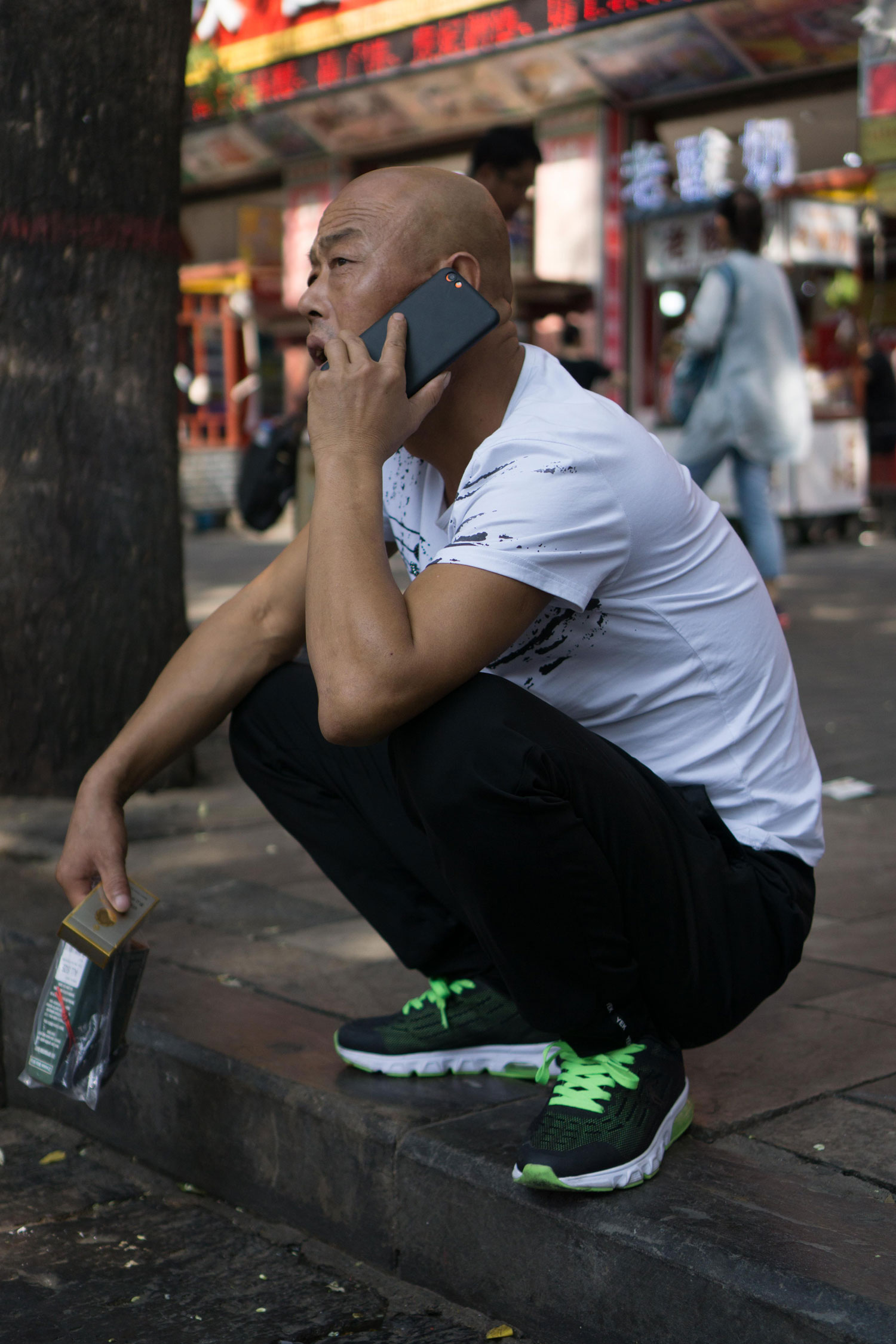 On the phone: A pedestrian makes a phone call on Muslim Street in Xi’an, China. (JP/Benni Yusriza)
On the phone: A pedestrian makes a phone call on Muslim Street in Xi’an, China. (JP/Benni Yusriza)
Key Factors
China’s cashless revolution has surprised many. Two years ago, British newspaper The Independent billed Denmark to become the world’s first cashless nation. But, it turns out that the adoption of the mobile payment method has nothing to do with economic development, as the still-developing China is leading the game two years later. Bank of China reported that mobile payments reached 157 trillion yuan last year, or more than 200 times the amount made in the United States. At this rate, it looks only fair to assume that China, the first country to create banknotes, is set to become the first one to abandon them.
Learning from China’s story, experts have agreed that the ease of adopting the technology is one of the important keys that can sway people toward mobile payments. The adoption of QR code technology (quick response codes similar to bar codes) is crucial in the development of China’s Internet finance industry. Payment systems based on QR codes do not require sellers to spend more on credit card machines or bank fees. QR codes are more accessible than other more sophisticated technology, like near-field communication (NFC) technology that not all mobile phones have.
China’s mobile payment industry is rapidly growing also due to its low barriers for consumers. Mobile payment platforms in China are open to all smartphone users who have bank accounts. They don’t need to have credit cards, making it easier for people to use the technology.
 Nightlife: City lights glow in the rain in Beijing, China. (JP/Benni Yusriza)
Nightlife: City lights glow in the rain in Beijing, China. (JP/Benni Yusriza)
Lessons for Indonesia
China’s success story has enticed many countries to follow suit. A cashless society is a dream that many countries cherish to move toward a more efficient economy, mainly because they would have to print fewer banknotes if their citizens relied on mobile payments.
Economist from the Center for Strategic and International Studies (CSIS) Grace Dewi said that the most obvious benefit of developing a cashless system was better financial security.
“With cash, banknotes or coins, people can evade tax because it does not have names. Cash can easily be misused for illegal transactions, such as corruption or drug business. So, moving to a cashless society will reduce the risk,” said Grace.
 To the market we go: People flock to Chenghuangmiao Market in Shanghai, China. (JP/Ika Krismantari)
To the market we go: People flock to Chenghuangmiao Market in Shanghai, China. (JP/Ika Krismantari)
However, to make the most of the cashless society, she added, it would highly depend on how a country integrates the system into society.
“Society is not a monolithic entity. There is the government, law enforcement and the people who are all important to the creation of the cashless system,” Grace said. She attributes China’s success to the fact that the system was built in a rather monolithic society.
Following China is probably India. In February, the Indian government introduced the India QR to promote cashless transactions around the country. Some African countries are also on track to becoming cashless societies. Last year, Mastercard Inc. rolled out a QR code system in Africa that attracted 100,000 Nigerian traders.
 Pick your tea: Tourists visit a tea store in Chenghuangmiao Market in Shanghai, China. (JP/Ika Krismantari)
Pick your tea: Tourists visit a tea store in Chenghuangmiao Market in Shanghai, China. (JP/Ika Krismantari)
In Indonesia, the potential for mobile transactions is promising. The latest figures showed that mobile transactions stood at Rp 7.05 trillion ($523 million) last year, up from Rp 5.28 trillion from the previous year. In July this year, monthly transactions hit an all-time high of Rp 1.14 trillion. Currently, mobile transactions account for 22.68 percent of total domestic non-cash transactions. This is an exponential increase compared to the 2.3 percent recorded in 2009, according to Bank Indonesia.
With Indonesia’s mobile device penetration having surpassed its population of more than 250 million, of which 102 million people use smartphones, the country has a bright prospect to become a cashless nation.
As an old saying goes, “Seek knowledge and wisdom even if you have to go as far as China,” it is time for Indonesia to learn from the land of Confucius on this aspect of the material world.
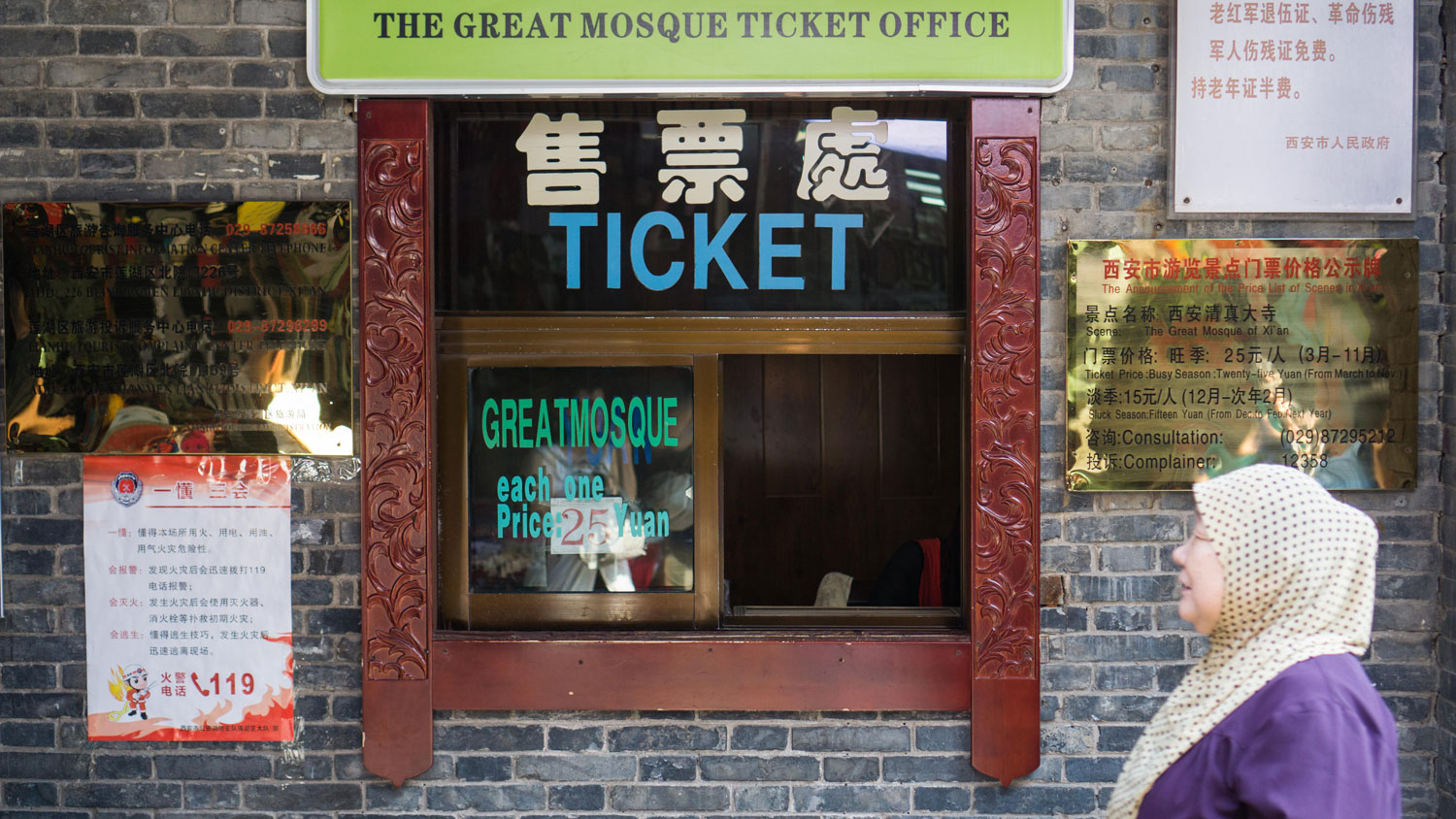 We are open: A ticket office in China’s Great Mosque in Xi’an, China. Each entry ticket costs 25 yuan (US$3.79). (JP/Benni Yusriza)
We are open: A ticket office in China’s Great Mosque in Xi’an, China. Each entry ticket costs 25 yuan (US$3.79). (JP/Benni Yusriza)
Experience of modern China just a few clicks away
Whether it is strolling around the Summer Palace in Beijing, marveling at the collection of more than 2,000-year-old terracotta sculptures in Xi’an, savoring a halal delicacy in a Muslim street or experiencing nightlife in Shanghai, the experience of traveling in China is not always on par with the country’s amazing digital progress.
A few years back, many people believed that traveling to China was not for the faint-hearted. It took enormous determination and courage, because visitors had to deal with challenges of culture and language. One important tip for tourists traveling to China was to always remember to bring their hotel card bearing the hotel’s name in Chinese characters to ensure they would be able to return to base safe and sound. Now we don’t need to do that anymore, because we can turn to various language apps to help us find our way back to the hotel.
 Out and about: Shoppers wander around a marketplace in Hangzhou, China. (JP/Ika Krismantari)
Out and about: Shoppers wander around a marketplace in Hangzhou, China. (JP/Ika Krismantari)
Technology, on the one hand, is indeed a blessing for foreign tourists in China, as its assistance makes life easier, especially for first-time visitors. Tourists can book admission tickets to tourist spots and get transportation services with just a few clicks. Visitors don’t have to worry too much about carrying lots of cash around, because mobile payments are ubiquitous. Even a candy stall in the Muslim street in Xi’an displays a QR code that people can scan to pay via a mobile payment platform.
The comfort of traveling brought about by technology is expected to boost China’s tourism industry. The Chinese government plans to promote the use of information technology to facilitate the growth of the tourism industry by 2020. Under the vision, all tourist areas classified as 4A sites or above will feature free WiFi, audio guides and online reservations. The 4A rating is the second-highest in a five-level assessment system. 5A-rated sites include the Great Wall in Beijing and the Museum of the Terracotta Army in Xi’an.
The plan, announced earlier this year, is to increase China’s annual investment in the tourism sector to 2 trillion yuan (US$300 billion) by 2020, up from 1.3 trillion yuan in 2016, according to Xinhua News Agency.
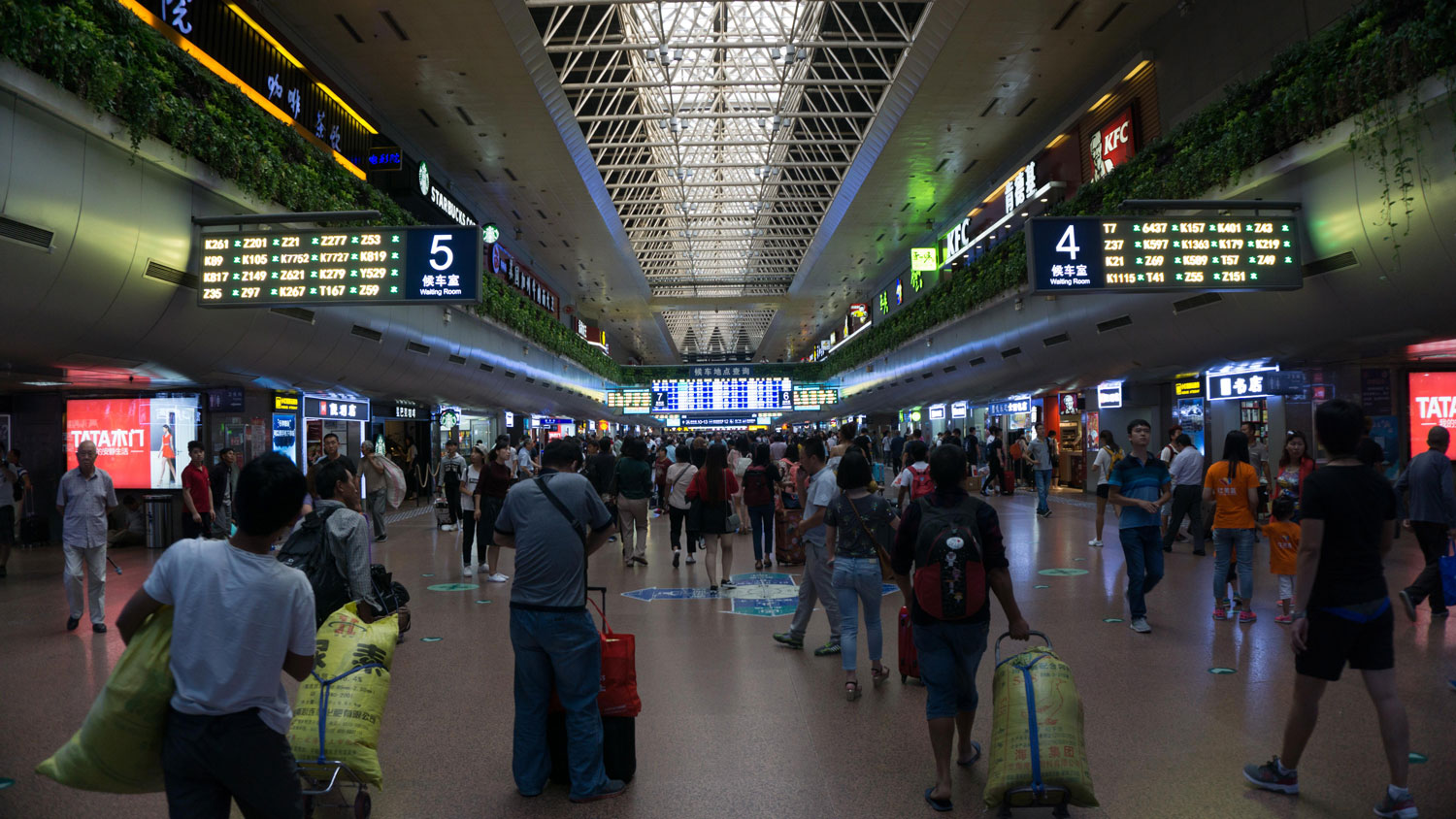 Wanderlust: People come and go at a train station in Beijing, China.(JP/Benni Yusriza)
Wanderlust: People come and go at a train station in Beijing, China.(JP/Benni Yusriza)
However, not everyone is happy about being fully dependent on technology in China, where the digital ecosystem is subject to the government’s strict censorship policy. Google is blocked and so are social media platforms like Facebook, Twitter and Instagram, and recently authorities banned the hugely popular WhatsApp chatting service, making it difficult for people to make contact with others when they are in China.
 Welcome: Receptionists greet a guest at Sina Weibo office in Beijing, China. (JP/Ika Krismantari)
Welcome: Receptionists greet a guest at Sina Weibo office in Beijing, China. (JP/Ika Krismantari)
Visitors usually have two options to stay connected while in China: Either they download a virtual private network (VPN) app to get around the barriers or download the software for the local platforms. For example, China has Baidu instead of Google and Weibo for social media.
Social media addict Rio Ardhillah says it is killing him not to have access to his Instagram and YouTube accounts from China. The 22-year-old Indonesian YouTube celebrity did download a VPN app but still failed get access his social media accounts from China.
“It is not cool to be [disconnected] like this,” he said, adding that he did not want to try the local platforms, as he was not familiar with them.
Indeed, using local platforms can be tricky. Almost all transactions in China are carried out online via local mobile payment apps. For foreign tourists, using those unfamiliar systems is a steep learning curve. It is also a security issue for those who feel uncomfortable about giving away their credit card credentials to unknown parties in a foreign country.
One infrastructure facility for travelers is a bicycle-sharing system that allows people to explore different places by bike. At a cost of $0.14 per hour and a deposit fee of $43, the system allows users to pick up a bike and leave it anywhere. But as the Post experienced, it is not easy to get the bikes unlocked, because doing so requires a smartphone app connected to an online payment system that seems to be designed for locals only. Repeated attempts to access the service proved to be in vain.
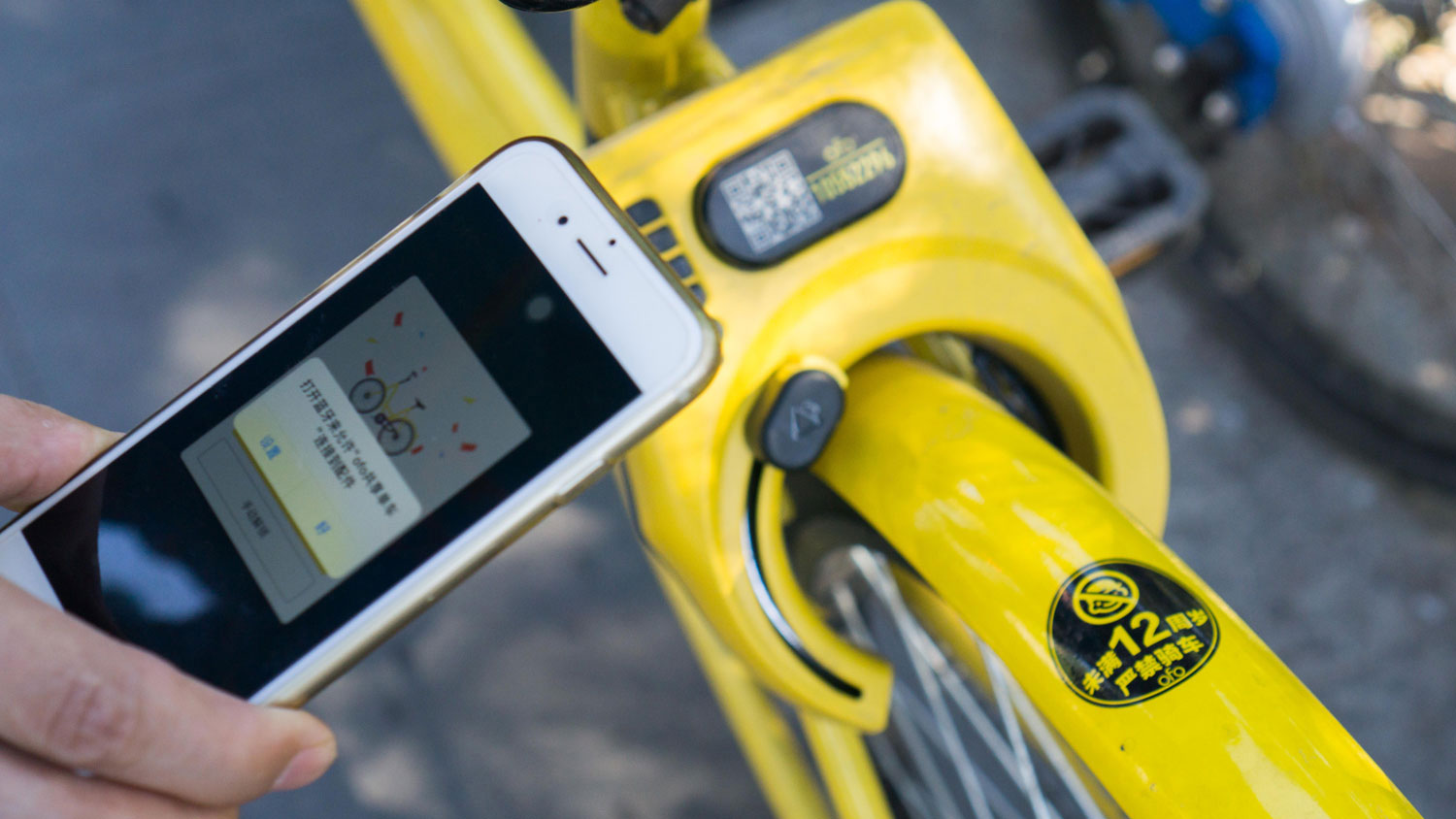 Going mobile: A bike rental service in China offers mobile booking and payment through QR code technology. (JP/Benni Yusriza)
Going mobile: A bike rental service in China offers mobile booking and payment through QR code technology. (JP/Benni Yusriza)
In addition to technological challenges, a major problem China must tackle to achieve the 2020 target is preparing the locals’ mentality to create a comfortable and friendly environment for tourists.
Local people cutting the line instead of waiting their turn was a very common sight during the seven-day trip organized by The Jakarta Post and Tenggara Strategics. Showing no sign of guilt, some locals just moved ahead, leaving behind people who are waiting patiently at train stations, museum entrances or lavatories.
Another challenge for travelers are China’s dirty bathrooms. Indonesian photographer Diera Bachir, 32, likened going to the bathroom to entering a warzone.
“I would just hold it until I find clean toilets,” was her strategy to deal with the issue.
The country’s remarkable technological progress, perhaps, would yield greater benefits to China if it were accompanied by a campaign to improve people’s manners in public places.
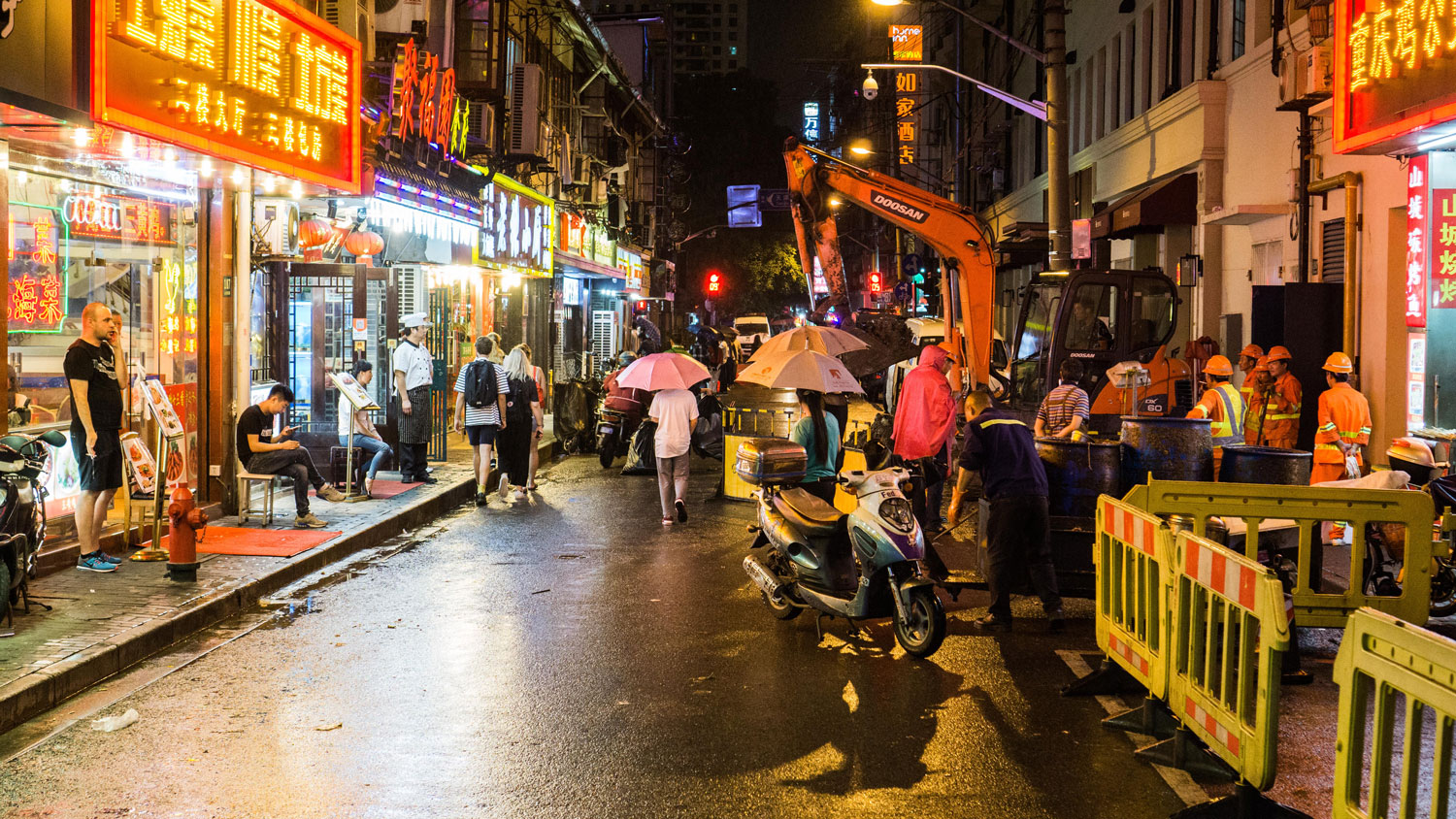 Under the rain: A street is packed with stores and pedestrians in Shanghai, China. (JP/Benni Yusriza)
Under the rain: A street is packed with stores and pedestrians in Shanghai, China. (JP/Benni Yusriza)
| Producer | : | Ika Krismantari |
| Writers | : | Benni Yusriza, Ika Krismantari |
| Senior Managing Editor | : | Kornelius Purba |
| Managing Editors | : | Primastuti Handayani, Rendi A. Witular, M. Taufiqurrahman, Damar Harsanto |
| Desk Editors | : | Pandaya, Imanuddin Razak |
| Art & Graphic Design Head | : | Budhi Button |
| Photographers | : | Ika Krismantari, Benni Yusriza |
| Technology | : | Muhamad Zarkasih, Ega Agung Nugraha, Mustopa |
| Multimedia | : | Bayu Widhiatmoko, I Gede Dharma JS, Rian Irawan, Ahmad Zamzami,
Jessica Widartha |



